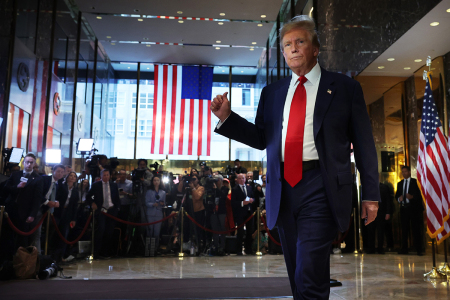Supreme Court rules Trump has immunity from prosecution

The United States Supreme Court has ruled that former President Donald Trump and other U.S. presidents are immune from prosecution for official acts undertaken while in office.
The Supreme Court released its much-anticipated decision in the case of Trump v. United States on Monday morning. The case centered on whether the presumptive Republican presidential nominee was immune from certain charges he was facing from an indictment last year.
In a 6-3 decision, the high court concluded that while “the President is absolutely immune from criminal prosecution for conduct within his exclusive sphere of constitutional authority,” such immunity does “not extend to conduct in areas where his authority is shared with Congress.”
Chief Justice John Roberts delivered the majority opinion, concluding that a former president has “some immunity from criminal prosecution for official acts during his tenure in office,” with the immunity being “absolute” when the president exercises “his core constitutional powers.”
“As for his remaining official actions, he is also entitled to immunity,” Roberts wrote. “At the current stage of proceedings in this case, however, we need not and do not decide whether that immunity must be absolute, or instead whether a presumptive immunity is sufficient.”
The Supreme Court vacated a judgment from the Court of Appeals for the D. C. Circuit, and remanded the case back for further proceedings consistent with the high court’s opinion.
“The President enjoys no immunity for his unofficial acts, and not everything the President does is official. The President is not above the law,” Roberts continued. “But Congress may not criminalize the President’s conduct in carrying out the responsibilities of the Executive Branch under the Constitution.”
“The President therefore may not be prosecuted for exercising his core constitutional powers, and he is entitled, at a minimum, to a presumptive immunity from prosecution for all his official acts. That immunity applies equally to all occupants of the Oval Office, regardless of politics, policy, or party.”
Justice Sonia Sotomayor authored a dissenting opinion, being joined by Justices Ketanji Brown Jackson and Elena Kagan, in which she argued that the decision “makes a mockery of the principle, foundational to our Constitution and system of Government, that no man is above the law.”
“The Court now confronts a question it has never had to answer in the Nation’s history: Whether a former President enjoys immunity from federal criminal prosecution,” wrote Sotomayor. “The majority thinks he should, and so it invents an atextual, ahistorical, and unjustifiable immunity that puts the President above the law.”
“Nothing in our history, however, supports the majority’s entirely novel immunity from criminal prosecution for official acts. The historical evidence that exists on Presidential immunity from criminal prosecution cuts decisively against it.”
Last year, special counsel Jack Smith charged Trump with four felonies related to the Jan. 6 Capitol riot in response to the outcome of the 2020 election.
These charges levied by Smith included conspiracy to obstruct an official proceeding, conspiracy to defraud the United States, and exploiting the Jan. 6 protest to remain in power.
“The attack on our nation’s capital on Jan. 6, 2021, was an unprecedented assault on the seat of American democracy,” stated Smith, as quoted by Politico.
“It was fueled by lies — lies by the defendant — targeted at obstructing a bedrock function of the U.S. government: the nation’s process of collecting, counting and certifying the results of the presidential election.”
For his part, Trump has argued that his actions were protected by “presidential immunity,” arguing that his actions were official acts that were part of his duties as president.
Two lower courts ruled against the former president, with the Supreme Court — three of whose members were nominated by Trump — eventually agreeing to hear an appeal.
Since leaving office, Trump has dealt with numerous legal issues regarding an array of allegations of unlawful behavior.
In May, for example, a New York jury found Trump guilty of 34 charges related to falsifying business records stemming from an allegation that Trump paid porn star Stormy Daniels (real name Stephanie Clifford) $130,000 in 2016 to conceal an alleged sexual encounter years earlier, in 2006, while he ran for president.





















